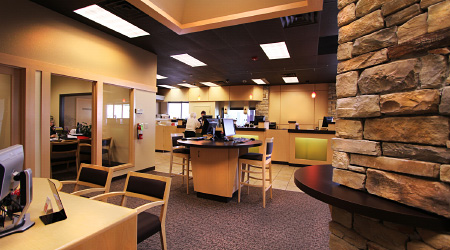What Is Online Banking?

When compared to traditional brick-and-mortar financial institutions, online banking provides all the familiar banking services and more. No longer are consumers relegated to banker's hours and getting in line with a dozen other people during a lunch break to deposit a couple of checks. Access to the Internet means all traditional banking services plus many which can only be completed online are now available to virtually every consumer who has a checking or savings account.
Online Banking Basics
As every consumer knows, when you open a checking or savings account at your local bank or credit union you sign some paperwork, get a couple of starter or order personalized checks and make an initial deposit. If you wanted cash you would see a teller or use an ATM. If you wanted to move funds or check your balance you could call the bank's 800-number. Websites and broadband connections have made online banking more convenient than more traditional options while providing significantly more value. Now, after opening an account you are informed about the website and the various online banking features while a log in and password are created for your personal use.
Types of Banking Services
One of online banking's best features is that it combines everything a consumer would ever want to do in one location. It would be expected for a consumer to have the ability to check an account balance or make a auto loan payment especially if it's with the same financial institution. Payments however are not relegated to bank issued loans thanks to online bill pay. Now most consumers never need to mail a physical check ever again. Most online banking websites also incorporate customer service functions such as web-based chat or same day e-mail resolution.
Advantages of Online Banking
The most obvious advantages for online banking is related to its very nature. Websites are online and available for customer interaction 24 hours a day seven days a week. Did you forget to pay a bill or do you want to verify that a check has been cashed? With online banking this is never a problem because customers can log into their accounts and conduct any banking service whether it's two o'clock in the morning or six o'clock in the afternoon. Fees also tend to be lower, or in some cases completely eliminated, as a result of online banking availability. No more waiting in line and paying two dollars to have a monthly statement printed. No more paying for stamps to mail checks that can take up to a week to get to their destination.
Disadvantages of Online Banking
For the most part, online banking has very few if any disadvantages. For consumers who are not computer or Internet savvy it may be slightly daunting to use a website to conduct banking business. However, this isn't so much a disadvantage as it is a learning curve which is expected whenever experiencing a new technology. Another possible disadvantage is the risk of having your account hacked or falling victim to a phishing attack which may be trying to obtain your log in information. Again, this isn't specific to online banking and protecting passwords and personal information apply to any number of other websites.
Are There Any Risks?
The risks for online banking are comparable to any other situation where protecting your money is a priority. It wouldn't make sense to withdraw hundreds of dollars from a ATM in a dark parking lot on the wrong side of town and it is equally bad to be careless with your online banking information. Online banking has been in existence a long time now and virtually every financial institution implements multiple security measures to protect customer money and personal information. Two factor authentication and one-time use pass codes retrieved via e-mail are only a few of the current security options available. Avoid using public Wi-Fi to conduct any financial transaction whenever possible whether it's transferring money on your bank's website or buying a product from a retailer. If used correctly, online banking is as secure, if not more so, than frequenting a traditional bank or credit union branch.







